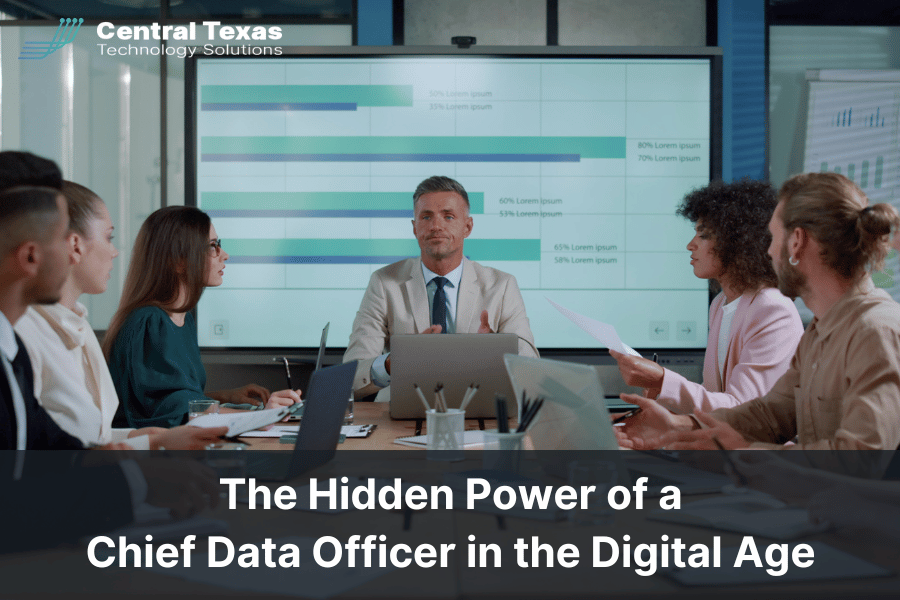
As a business leader, you’re navigating an era where data is more valuable than ever. But with oceans of information at your fingertips, are you truly harnessing its full potential? Without a clear data strategy, opportunities slip away, and decisions become guesswork. That’s where a Chief Data Officer (CDO) can make all the difference.
What Does a Chief Data Officer Do?
A Chief Data Officer is the key architect of your company’s data strategy, overseeing how information is collected, managed, and leveraged to drive business growth. The role is designed to turn raw data into actionable insights, ensuring that every decision is backed by reliable and ethical data practices.
The Core Responsibilities of a Chief Data Officer:
- Developing and implementing data strategies to align with business objectives
- Ensuring data quality, accuracy, and security across all departments
- Managing compliance with industry regulations and data privacy laws
- Optimizing data analytics to enhance decision-making
- Driving innovation through emerging technologies like AI and machine learning
- Breaking down silos to foster collaboration between departments
- Cultivating a data-driven culture within the organization
By fulfilling these roles, a CDO helps transform data from a mere asset into a competitive advantage.
Why Your Business Needs a Chief Data Officer
In today’s fast-moving digital economy, businesses without a dedicated data leader often struggle with fragmented data, inconsistent reporting, and compliance risks. A Chief Data Officer brings order to chaos by creating a structured approach to data governance and analytics.
Key Benefits of Having a CDO:
- Stronger Decision-Making: Data-driven insights reduce guesswork and improve strategic planning.
- Enhanced Efficiency: Proper data management streamlines operations, eliminating redundancies and inefficiencies.
- Risk Reduction: A CDO ensures compliance with evolving data privacy laws, reducing legal and financial risks.
- Customer Experience Improvements: Data analytics help personalize experiences, increasing customer satisfaction and loyalty.
- Competitive Edge: Companies that use data effectively outperform competitors by identifying trends and opportunities faster.
Overcoming the Challenges of Data Leadership
While the benefits of hiring a CDO are clear, the role comes with its challenges. A successful CDO must navigate:
- Data Silos: Bridging gaps between departments to ensure seamless data flow.
- Evolving Regulations: Keeping up with data privacy laws like GDPR and CCPA.
- Rapid Technological Changes: Adapting to AI, cloud computing, and automation.
- Cultural Shifts: Encouraging company-wide adoption of data-driven practices.
- Resource Constraints: Addressing skill gaps and budget limitations.
The most effective Chief Data Officers tackle these issues head-on by fostering collaboration and embedding data literacy into company culture.
How to Empower Your Chief Data Officer for Success
Bringing a CDO on board is just the first step. To unlock their full potential, businesses must provide the right environment for success.
Best Practices for Supporting a CDO:
- Establish clear objectives that align with business goals.
- Ensure executive buy-in so data initiatives receive the necessary resources.
- Invest in modern data infrastructure to enable scalability and security.
- Encourage cross-functional collaboration between IT, marketing, finance, and operations.
- Promote continuous learning to keep up with new trends and technologies.
The Future of Business Lies in Data Leadership
Hiring a Chief Data Officer isn’t just about managing numbers—it’s about unlocking new growth opportunities and future-proofing your business. With the right CDO at the helm, companies can navigate the digital landscape with confidence, leveraging data to drive innovation, improve customer experiences, and achieve long-term success.
Frequently Asked Questions About a Chief Data Officer
1. Does every business need a Chief Data Officer?
While larger enterprises typically benefit most from a CDO, any company dealing with large volumes of data can gain a competitive edge by having a dedicated data leader. Even small businesses can leverage data expertise through fractional or consulting CDOs.
2. How does a CDO differ from a CIO or CTO?
A Chief Information Officer (CIO) focuses on IT infrastructure and technology strategy, while a Chief Technology Officer (CTO) leads product development and tech innovation. In contrast, a CDO specializes in data strategy, analytics, and governance, ensuring that business decisions are data-driven.
3. What industries benefit most from hiring a CDO?
Any data-driven industry can benefit from a CDO, including construction, legal, healthcare, professional services, manufacturing, and nonprofits. Businesses handling sensitive data or leveraging AI and automation particularly need strong data leadership to stay compliant and competitive.
Contact CTTS today for IT support and managed services in Austin, TX. Let us handle your IT so you can focus on growing your business. Visit CTTSonline.com or call us at (512) 388-5559 to get started!
